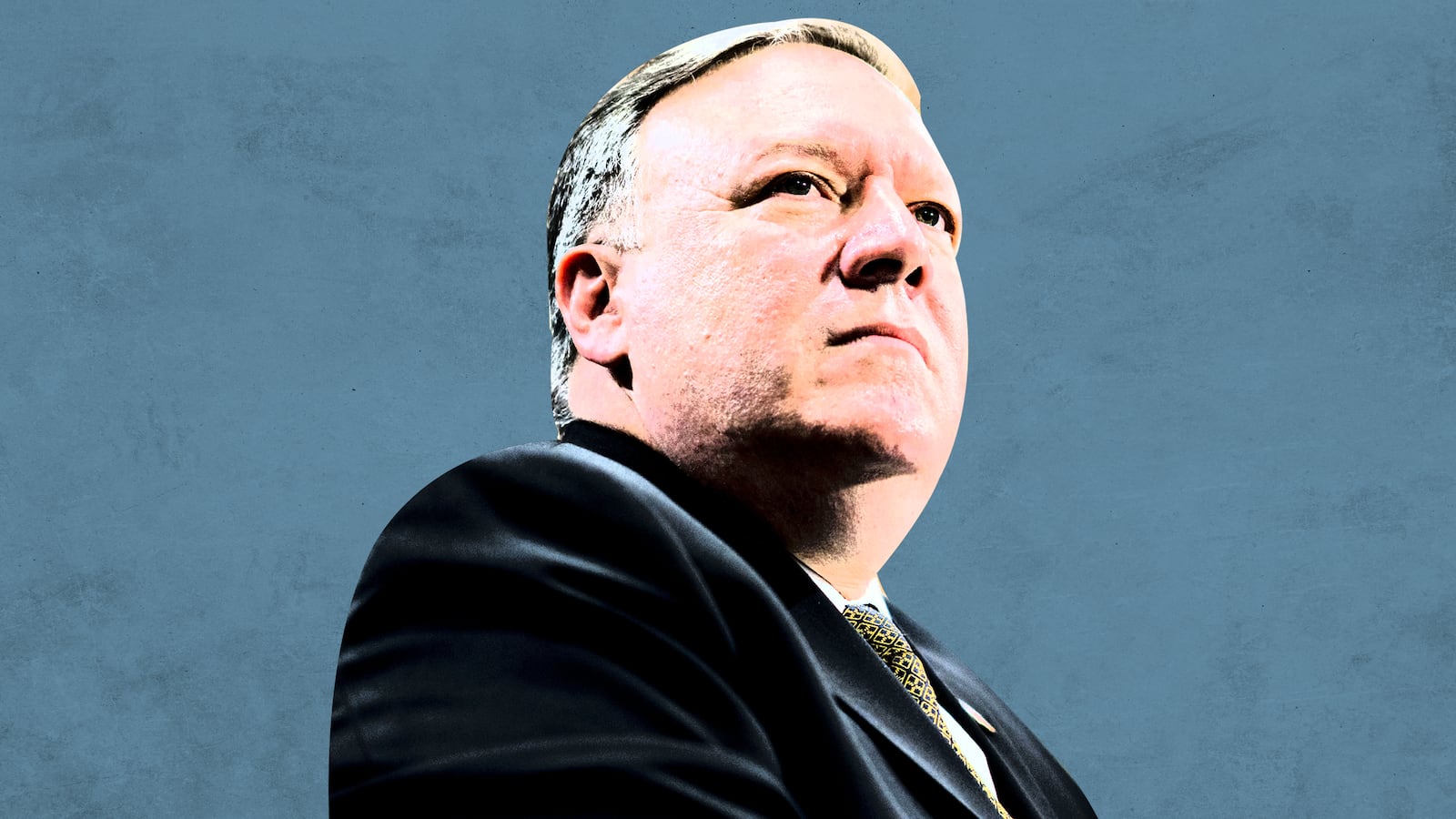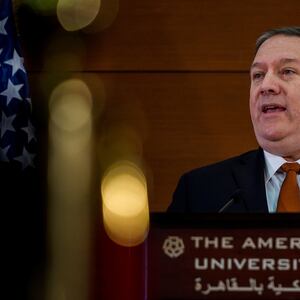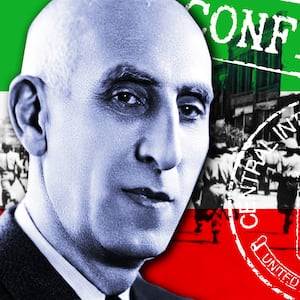The most difficult decisions in sound foreign policy frequently require finding the right balance between defensible competing options. Time and again, without regard to party or partisanship, American presidents have fallen off the balance beam when making such decisions, suffering bruised reputations and tragic consequences whenever consideration of short-term realpolitik has outweighed the essential importance of America’s democratic values.
Secretary of State Pompeo’s remarks in Cairo made it clear—if there was doubt remaining—which side of the debate the Trump administration is on. In a setting deliberately designed to create a contrast with President Barack Obama’s speech in the same city in 2009, Pompeo took aim at the very idea that our foreign policy should be based on American democratic values. Obama said “America seeks a new beginning… around the world, based on mutual interests and mutual respect and common principles of justice and progress, tolerance and the dignity of all human beings;” but the word “rights” did not appear once in Pompeo’s remarks.
Pompeo made no direct reference to rampant human rights abuses in Egypt under President Abdel Fattah el-Sisi, including the estimated 60,000 political opponents he has jailed. His speech praised Saudi Arabia for helping contain Iran but did not mention the killing of Jamal Khashoggi by members of the Saudi Royal family.
Unlike any other nation on earth, America is defined by its belief in ideas—not blood and soil. But our principles of equality, freedom, justice, human rights and the rule of law have too frequently been abandoned to myopic constructs of strategic interest, themselves often relics of different times and different circumstances. These bad choices too often boomerang and explode, sometimes with catastrophic results.
The litany is disheartening.
In the early 1950s, Mohammad Mosaddegh was the democratically elected president of Iran. In the waning days of the Truman Administration, the CIA tried to convince the President that he was not a liberal nationalist but a communist sympathizer, and to launch a covert action to topple the government. Truman was skeptical and refused U.S. intervention.
But, shortly after President Dwight Eisenhower was inaugurated in 1953, the CIA convinced him to give the green light to the CIA’s “Operation Ajax,” triggering riots and violence in Iran’s major cities. That gave the Shah of Iran the pretense to dismiss the democratically elected government and seize control. After this coup, the Shah consolidated power, received $10 billion worth of US arms and with American help created the infamous SAVAK, the feared security agency and an instrument of dictatorial terror. Successive US administrations supported the Shah, continuing the myopic strategic narrative that denied the Iranian people the same rights that Americans enjoyed.
Even during the Carter presidency—a presidency that had created the first State Department Assistant Secretary position for human rights, publicly stating that human rights and democracy were centerpieces of U.S. foreign policy—the United States did nothing to force the Shah to institute reform, eliminate press censorship, free political prisoners or open Iran’s political system.
American support for the Shah’s brutal dictatorship resulted in the Iranian revolution of 1979, which toppled the hated Shah and established an extremist Islamic government that broke relations with the United States and continues to sponsor terrorism all over the world ever since.
Unfortunately, Iran isn’t the only example of how U.S. foreign policy has forfeited American human rights and democratic values for short term strategic gain. In 1973, Richard Nixon turned his back on and refused to resupply Israel in the first days of the Yom Kippur War, bringing Israel to within hours of using nuclear weapons in its defense.
In 1977 the Carter Administration did nothing to stop a military coup in Pakistan that set democracy in that country back for a generation and triggered an explosion of Islamic extremism.
In December of 1977, only one month after Egyptian President Sadat’s historic trip to Jerusalem, President Carter traveled to Riyadh, Saudi Arabia and didn’t pressure the repressive Saudi monarchy to join the peace process while agreeing to sell them a fleet of F15 jets, as the Saudis used the price of oil as leverage in their negotiations.
The disheartening list goes on.
In 1981 Ronald Reagan capitulated to the Zia dictatorship in Pakistan in return for Pakistan’s military help in Afghanistan.
Later, President Bush legitimized the Musharraf dictatorship in return for Pakistan’s disingenuous cooperation in the war against terror after 9/11.
In 2001, President George Bush refused to condemn the government of Saudi Arabia for its complicity in the 9/11 attacks that killed 3,000 American citizens. He even allowed members of the Saudi royal family to fly out of the country after all air travel in the U.S. had been suspended.
There have been brighter moments when America stayed true to our democratic values. President Truman recognized the State of Israel at its creation because of its democratic structure. President Carter’s creation of a Human Rights Bureau was an important institutional statement for US foreign policy, however haphazardly its human rights standards were applied. Ronald Reagan held up American democratic values to the world calling the U.S. “a shining city on the hill.” George Herbert Walker Bush in his Inaugural address, said “America’s belief in human dignity will guide our policies, yet rights must be more than the grudging concessions of dictators.” The success of the decisions based on these pronouncements suggests we would do well to tilt the balance of our foreign policy toward our values, not away from them.
This lesson should be at the forefront of our decision making in the Middle East, particularly with regard to the current travesty in Saudi Arabia.
The Crown Prince of Saudi Arabia, Mohammed bin Salman, has arrested over 2,600 political dissidents who now rot in Saudi jails, imprisoned for crimes of “criticizing the Royal Court” and “ridiculing religious figures.” His brutal crackdown on the Saudi press culminated in his direct order (according to the CIA) to kill U.S. resident and Washington Post columnist Jamal Khashoggi.
The Trump Administration, unlike our allies, has refused to hold Saudi Arabia accountable for Khashoggi’s murder and the widening reign of terror of the Crown Prince. Since Trump won’t make human rights and democratic values central to his foreign policy, the Congress must.
The Founding Fathers gave broad foreign policy and military authority to the Congress of the United States well beyond the power to declare war. Article I enumerates at least 11 separate responsibilities of congressional authority in foreign and military affairs. Article II delineates only two specific foreign and military powers for the President.
The U.S. Senate took a good first step up to their constitutional responsibilities by unanimously condemning the Saudi Crown Prince, despite President Trump’s and Secretary of State Pompeo’s opposition. The 116th Congress needs to do more.
Early in 2019, a bicameral and bipartisan coalition should put a War Powers bill limiting US participation in the Saudi Yemen War on President Trump’s desk. We should learn from the past and not empower the Saudi Crown Prince as we disastrously coddled the Shah of Iran.
The intelligence committees in both the Senate and the House, should hold hearings on what role if any Trump’s family’s business dealings played in their decision to avoid assigning blame for Kashoggi’s murder on the Saudi royal family. Based on the outcomes of those hearings, the Congress should impose its own policy toward Saudi Arabia through the appropriations process on whatever remains of the foreign policy apparatus in the Trump administration.
Even if President Trump doesn’t believe in the power, force and example of American ideals, the new 116th Congress can make the right choice and quickly show us that they do.
Mark Siegel was Deputy Assistant to President Carter and now teaches at The Center for Global Affairs at NYU.
Morley Winograd was Senior Policy Advisor to Vice President Gore and is now Senior Fellow at USC Annenberg Center for Communication Leadership & Policy.








